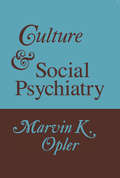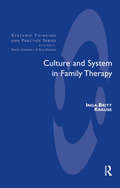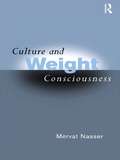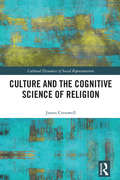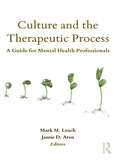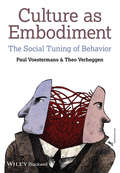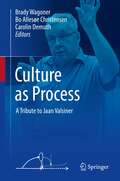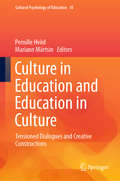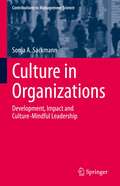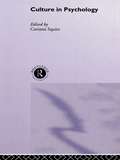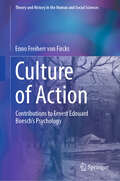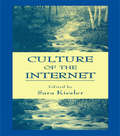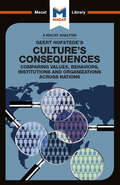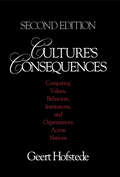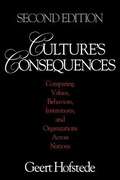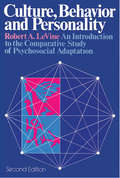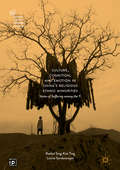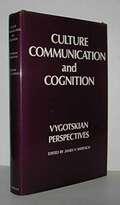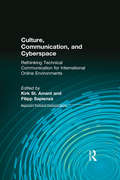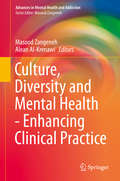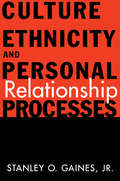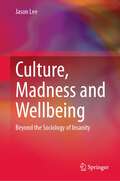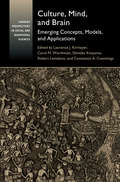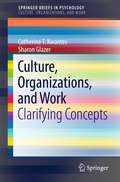- Table View
- List View
Culture and Social Psychiatry
by Marvin K. OplerThis brilliant and engrossing work of social synthesis, replete with profound insights, opens up new vistas on the relationship between culture and mental health. The author uses his own extensive findings and his abundant knowledge of the cross-cultural studies in psychiatry, anthropology, and sociology to demonstrate that throughout history mental disorders have been closely linked with the prevailing culture and have thus changed in kind and extent.Opler's classic Culture, Psychiatry, and Human Values has here been revised and expanded to nearly twice the size of the original work. The new materials present in greater depth the author's views on the connection between culture and mental health and broaden the perspectives of theory and research on cultural change and development, the migration of acculturating populations, and the resulting shifts in diagnostic and therapeutic problems brought about by the stresses of the modern world.By enriching a survey of cultural evolution with fertile cross-cultural comparisons and a discussion of the interaction between culture and personality, Opler adds to our knowledge of the etiology and treatment of mental illnesses in primitive societies as well as among more advanced ethnic groups and subcultures in today's metropolis. Of particular significance at a time when social and community psychiatry has assumed a major role all over the world, this pioneering work is must reading not only for students of culture and personality, psychiatrists, social scientists, and workers in community health programs, but also for the educated reader concerned about these critical problems of our day.
Culture and System in Family Therapy (The Systemic Thinking and Practice Series)
by Inga-Britt KrauseStarting with the MacPherson Report and its pronouncements on racism in Britain and in particular 'institutionalised racism', Dr Krause focuses in this important book on the practice of family therapy and draws on her expertise as both anthropologist and systemic family psychotherapist to formulate a cogent critical evaluation of the field. At the heart of her book, furnished with very useful clinical material is a concern to identify the necessary conditions for an 'anti-discriminatory, non-ethnocentric and ethical way of working cross-culturally'. In illuminating the way in which underlying and frequently unexamined assumptions serve to perpetuate institutionally discriminatory outcomes, the author outlines a model for the development of a culturally sensitised, questioning, and self-reflexive practice. This book will serve as an individual reference-point for all those concerned to avoid and eliminate institutional discrimination.
Culture and Weight Consciousness
by Mervat NasserAnorexia nervosa and bulimia are among the few psychiatric syndromes with a plausible socio-cultural model of causation. Issues of culture and slimness are usually considered in terms of the experience of the western world, but there is a growing body of research suggesting that concern with slimness is becoming more prevalent in non-western cultures. In Culture and Weight Consciousness, Mervat Nasser brings together this research and looks at the recent emergence of eating disorders in cultures that were previously free of such problems. She relates the feminist theories that have been put forward to explain the phenomenon of eating disorders in the west to the condition of modern women in many non-western cultures and concludes that their position is not at all that different from that of their western counterparts. This leads her to address the current limitations of the concept of culture and draw out the implications for future research.
Culture and the Cognitive Science of Religion (Cultural Dynamics of Social Representation)
by James CresswellCulture and the Cognitive Science of Religion is the first book to bring together cultural psychology and the cognitive science of religion (CSR). Containing much-needed discussion of how good research should do more than simply follow methodological prescriptions, this thought-provoking and original book outlines the ways in which CSR can be used to study everyday religious belief without sacrificing psychological science. Cresswell’s pragmatist approach expands CSR in a radically new direction. The author shows how language and culture can be integrated within CSR in order to achieve an alternative ontogenetic and phylogenetic approach to cognition, and argues that a view of cognition that is not based on modularity, but on the dynamic connection between an organism and its milieu, can lead to a view of evolution that makes much more room for the constitutive role of culture in cognition. As a provocative attempt to persuade researchers to engage with religious communities more directly, the book should be essential reading for academics, researchers and postgraduate students, as well as psychologists interested in the cognitive science of religion, theological anthropology, religious studies and cultural anthropology.
Culture and the Therapeutic Process: A Guide for Mental Health Professionals (Counseling and Psychotherapy)
by Mark M. Leach Jamie D. AtenWhile there are numerous resources for practitioners on the subject, the ambiguity remains of what actually constitutes effective multicultural counseling and psychotherapy and how it should be incorporated into their sessions. This book addresses the question of how to apply current theories and research with a unique “start-to-finish” approach, examining the role culture plays in each stage of the therapeutic process, from before the clinical intake to termination. Each chapter is devoted to one of these stages and provides practical strategies, techniques, examples, and case studies. The reader will find new ways to consider the influence of culture and expand their own knowledge and skills as a practitioner.
Culture as Embodiment
by Paul Voestermans Theo VerheggenCulture as Embodiment utilizes recent insights in psychology, cognitive, and affective science to reveal the cultural patterning of behavior in group-related practices.Applies the best of the behavioural sciences to contemporary issues of behavioural cross-fertilization in global exchangePresents an original theory to be used in the gender and integration debates, about what the acceptance of newcomers from different cultural backgrounds really entailsPresents a theory that is also applicable to youth culture and the split in modern society between underclass, modal class, and the eliteContains an original approach to the persistence of religion, and relates religious thought to the cognitive capacity of generic belief
Culture as Process: A Tribute to Jaan Valsiner
by Brady Wagoner Bo Allesøe Christensen Carolin DemuthJaan Valsiner has made numerous contributions to the development of psychology over the last 40 years. He is internationally recognized as a leader and innovator within both developmental psychology and cultural psychology, and has received numerous prizes for his work: the Alexander von Humboldt prize, the Hans Killian prize, and the Outstanding International Psychologist Award from the American Psychological Association. Having taught at Universities in Europe, Asia and north and south America, he is currently Niels Bohr professor at Aalborg University, Denmark. This book is the first to discuss in detail the different sides of Valsiner’s thought, including developmental science, semiotic mediation, cultural transmission, aesthetics, globalization of science, epistemology, methodology and the history of ideas. The book provides an overview, evaluation and extension of Valsiner’s key ideas for the construction of a dynamic cultural psychology, written by his former students and colleagues from around the world.
Culture in Education and Education in Culture: Tensioned Dialogues and Creative Constructions (Cultural Psychology of Education #10)
by Pernille Hviid Mariann MärtsinIn a world where the global engagement and international dialogue intensifies, some areas of cultivated knowledge suffer from this dialogue and this has consequences for people and communities. We propose education to be such a case. The global dialogue in education tends to be restricted to and mediated by standardized measurements. Such standards are meant to measure qualities of education and of student behavior and create the sought for condition for normative comparability and competition. The obvious drawback is that cultural variability – in local living as well as in education – is rendered irrelevant. Are there alternatives? The book insists on maintaining the discussion about education on a global level, but rather than moving towards homogenization and standardization of education, the attention is drawn towards the potential for learning from creative fits - and misfits - between concrete local cultures, institutional practices and global aims and standards of education. This work brings together a group of educational and developmental researchers and scholars grappling to find culturally informed and sensitive modes of educating people and communities. Case studies and examples from four geographical contexts are being discussed: China, Brazil, Australia and Europe. While being embedded in these local cultures, the authors share a conceptual grounding in cultural developmental theorizing and a vision for a culturally informed globalized perspective on education. As the theme of the book is learning from each other, the volume also includes commentaries from leading scholars in the field of cultural psychology and education.
Culture in Organizations: Development, Impact and Culture-Mindful Leadership (Contributions to Management Science)
by Sonja A. Sackmann“Culture eats strategy for breakfast”. Peter Drucker’s provocative statement points to the importance of culture for organizations. Depending on its characteristics, culture contributes significantly to the success or failure of for-profit and not-for-profit organizations. Hence, managers and leaders need to have an understanding of this important concept for best results. This book provides relevant knowledge about the concept of culture. This includes its major characteristics and dimensions, the way culture functions and influences both the internal life of an organization and the resulting performance. The book describes the emergence and development of culture over time as well as the formation and influence of subcultures. Even though culture is always present, certain situations call for specific attention such as fast growth or stagnation, strategic alliances, M&As or situations of change. The book describes how to go about understanding and assessing an organization’s culture as a basis for culture change interventions as well as culture-sensitive and culture-mindful management and leadership.
Culture in Psychology
by Corinne SquireCulture in Psychology breaks new ground by attempting to understand the complexity and specificity of cultural identities today. It rejects the idea that Western culture is a standard, or that any culture is homogenous and stable. Equally, it rejects the notion that culture is a mechanism that enhances reproductive fitness. Instead, it alerts psychologists to the many forms of 'foreignness' that research should address and to alliances psychology can make with other disciplines such as anthropology, feminism and psychoanalysis. Part one explores the origins of the new 'cultural psychology' in social change movements, in fields such as ethnography and cultural studies, and as a response to evolutionary psychology. Part two looks at how people create and sustain the meanings of social categories of 'class', gender, 'race' and ethnicity, while the third part examines the interaction between written and visual representations in popular culture and everyday lived culture. The final part examines the idiosyncratic significance cultural forms have for individuals and their unconscious meanings.
Culture of Action: Contributions to Ernest Edouard Boesch’s Psychology (Theory and History in the Human and Social Sciences)
by Enno Freiherr von FircksThe present work introduces innovative research on Symbolic Action Theory, blending theoretical insights with practical applications in psychology. It revisits Ernest Boesch's foundational concepts in Symbolic Action Theory and proposes further advancements in the field. These contributions pave the way for theoretical refinements as well as applied research aimed at enriching clinical, educational, and life-philosophical interventions both within and beyond academic contexts. This book is designed to engage psychologists from diverse specialties while also serving as a valuable resource for practitioners operating in clinical and non-clinical settings alike.
Culture of the Internet
by Sara KieslerAs we begin a new century, the astonishing spread of nationally and internationally accessible computer-based communication networks has touched the imagination of people everywhere. Suddenly, the Internet is in everyday parlance, featured in talk shows, in special business "technology" sections of major newspapers, and on the covers of national magazines. If the Internet is a new world of social behavior it is also a new world for those who study social behavior. This volume is a compendium of essays and research reports representing how researchers are thinking about the social processes of electronic communication and its effects in society. Taken together, the chapters comprise a first gathering of social psychological research on electronic communication and the Internet. The authors of these chapters work in different disciplines and have different goals, research methods, and styles. For some, the emergence and use of new technologies represent a new perspective on social and behavioral processes of longstanding interest in their disciplines. Others want to draw on social science theories to understand technology. A third group holds to a more activist program, seeking guidance through research to improve social interventions using technology in domains such as education, mental health, and work productivity. Each of these goals has influenced the research questions, methods, and inferences of the authors and the "look and feel" of the chapters in this book. Intended primarily for researchers who seek exposure to diverse approaches to studying the human side of electronic communication and the Internet, this volume has three purposes: * to illustrate how scientists are thinking about the social processes and effects of electronic communication; * to encourage research-based contributions to current debates on electronic communication design, applications, and policies; and * to suggest, by example, how studies of electronic communication can contribute to social science itself.
Culture's Consequences: Comparing Values, Behaviors, Institutes and Organizations across Nations (The Macat Library)
by Katherine ErdmanThe Dutch anthropologist Geert Hofstede is recognized as a pioneer in the fields of international management and social psychology – and his work is a perfect example of the ways in which interpretative skills can help solve problems and provide the foundation for strong thinking and understanding both in business and beyond. Hofstede’s central achievement was setting up an efficient interpretative framework for understanding the cultural differences between one country and another. Working for the international computing company IBM in the late 1960s, Hofstede noted that such cultural differences had huge consequences for international organizations. Up until then, while many inside and outside of business recognized the importance of these differences, little had been done to define precisely what cultural difference was and in what areas of life it was expressed. Hofstede’s insight was that if one could interpret and define the dimensions of cultural difference, it would be possible to measure them and act accordingly. From a vast survey of IBM’s employees in several countries, Hofstede originally defined five dimensions of culture: every society could be rated for each dimension, providing a useful guide to the kinds of cultural differences at play. As ever, good interpretative skills provided the basis for better understanding.
Culture's Consequences: Comparing Values, Behaviors, Institutions and Organizations Across Nations
by Dr Geert HofstedeGeert Hofstede has completely rewritten, revised and updated Culture's Consequences for the twenty-first century, he has broadened the book's cross-disciplinary appeal, expanded the coverage of countries examined from 40 to more than 50, reformulated his arguments and a large amount of new literature has been included. The book is structured around five major dimensions: power distance; uncertainty avoidance; individualism versus collectivism; masculinity versus femininity; and long term versus short-term orientation.
Culture's Consequences: Comparing Values, Behaviors, Institutions, and Organizations Across Nations
by Geert HofstedeHofstede's classical book offers five dimentions on which culture across countries can be examined.
Culture, Behavior, and Personality: An Introduction to the Comparative Study of Psychosocial Adaptation
by Robert A LeVineThis new edition of Culture, Behavior, and Personality is organized into ve parts. Part I de nes the eld of inquiry, Part II presents a critical review of existing theories and methods, Part III expounds LeVine's unique Darwinian model of culture and personality, Part IV deals with the strategies and methods with which to study individual dispositions within the sociocultural matrix, Part V concludes with two essays on cultural and personality research including new advances and avenues of research that have appeared within the last seven years.
Culture, Cognition, and Emotion in China's Religious Ethnic Minorities: Voices of Suffering among the Yi (Palgrave Studies in Indigenous Psychology)
by Louise Sundararajan Rachel Sing-Kiat TingThis study examines the suffering narratives of two religious communities--Bimo and Christian--of the Yi minority who reside in the remote mountains of Sichuan and Yunnan, China, respectively. It is informed by the theoretical framework of ecological rationality, which posits that emotions influence, and are influenced, by cognitive styles that have co-evolved with the ecological niche of a culture. It was predicted and found that in times of adversity, traditional religious communities may differ in emotion expression, causal attribution, and help seeking behavior, with far-reaching ramifications in how they are uniquely vulnerable to the pitfalls of modernization. The authors hope that the voices of the study participants, heard through their harrowing narratives, may inspire a deepened sensitivity to the plight of rural Chinese communities as China races to become superpower in the global economy.
Culture, Communication And Cognition: Vygotskian Perspectives
by James V. WertschCulture, Communication, and Cognition: Vygotskian Perspectives
Culture, Communication and Cyberspace: Rethinking Technical Communication for International Online Environments (Baywood's Technical Communications)
by Kirk St. Amant Charles H Sides Filipp SapienzaThe increasingly global nature of the World Wide Web presents new challenges and opportunities for technical communicators who must develop content for clients or colleagues from other cultures and in other nations. As international online access grows, technical communicators will encounter a range of challenges related to culture and communication in cyberspace. These challenges include how to design content and develop services for online distribution to a culturally diverse audience of users; how to address cultural and linguistic factors effectively when collaborating with international colleagues and clients via online media; and how to develop effective online teaching and training practices and materials for use in learning environments comprised of culturally diverse groups of students. The contributors to Culture, Communication and Cyberspace examine these challenges through chapters that explore the different aspects of international online communication. The contributing authors use a range of methodologies to review a variety of topics related to culture and communication in cyberspace. In so doing, the authors also examine how business trends, such as international outsourcing, content management, and the use of open source software (OSS), are affecting and could change practices in the field of technical communication as related to online cross-cultural interactions.
Culture, Consolation, and Continuing Bonds in Bereavement: The Selected Works of Dennis Klass (World Library of Mental Health)
by Dennis KlassCulture, Consolation, and Continuing Bonds in Bereavement presents Dennis Klass’s most important contributions to the scholarship of grief and bereavement. Journal articles, book chapters, and previously unpublished works cover more than 40 years of study and practice on the forefront of our understanding of individual, family, and community grief. The writings range widely, including explorations of continuing bonds and consolation, aspects of grief that were missing when Klass began his work, studies of grief across different cultures, and critical analyses of theories that were popular in grief scholarship but inadequately described bereaved parents’ experiences. The book ends with a previously unpublished case study of Charles Darwin, whose experience as a bereaved parent informed the worldview at the heart of his theory of natural selection. This collection of essays offers an integral understanding of how individuals move through grief and is a valuable addition to the library of anyone working with topics relevant to grieving adults, children, and adolescents.
Culture, Diversity and Mental Health - Enhancing Clinical Practice: Enhancing Clinical Practice (Advances in Mental Health and Addiction)
by Alean Al-Krenawi Masood ZangenehThis book discusses the importance of culture and diversity within society through multicultural, cross-cultural, and intercultural encounters while applying psychological effectiveness to manage core competencies. It carefully explains how influential the social environment is to an individual within a society. It seeks to directly affect mental health practitioners’ treatment within practices in accordance to specific ethno-cultural clients; and it seeks to encourage students and practitioners to practice acceptance of diverse groups and multiracial communities. Although understanding various cultural norms and accepting diversity is not always simple, the book promotes a global understanding through identifying cultural benefits within a multiracial, multi-ethnic society, while evoking culturally competent techniques for mental health practitioners.
Culture, Ethnicity, and Personal Relationship Processes
by Stanley O. Gaines Jr.Culture, Ethnicity and Personal Relationship Processes reviews new theory and research on personal relationships among African, Latina/o and Asian Americans as well as personal relationships among different ethnic groups. The collection focuses on the give and take of affection and respect in personal relationships as influenced by specific cultural values. Using diverse strands of research from psychology, psychiatry, sociology and other disciplines, the contributors take both a retrospective and a prospective look at ethnicity and the reciprocity of affectionate and respectful behavior. Throughout the book, the reader will be challenged to take stock of common misperceptions currently blocking the way to a greater understanding of relational dynamics as a function of ethnicity.Contributors: Raymond Buriel, James Liu, and Diana Rios.
Culture, Madness and Wellbeing: Beyond the Sociology of Insanity
by Jason LeeThis book is a unique study of the historical, theoretical, and cultural interpretations of ‘madness’ including interviews with those who have experiences of ‘madness’. It takes a transdisciplinary approach, employing historical, psychological, and sociological perspectives through an intersectional lens. This work explains how the prioritization of thinking over feeling in Western thought means the transrational imagination has frequently been negated in tackling mental health with detrimental results. This book, therefore, examines creative media, especially film, as a transrational form of human expression for healing and wellbeing, along with television, theatre, social media, music, and computer games. ‘Madness’ with regards to gender, sexuality, adolescence, and class in media and film is interrogated, as well as ‘madness’ and race through a focus on colonialism, post-colonialism, and psychiatry. It analyses group psychosis, including celebrity culture, and the ‘madness’ of leaders and gurus. This book challenges the lasting influence of the Age of Reason by furthering our understanding of the value of transrationality and the diverse ways of being human.
Culture, Mind, and Brain: Emerging Concepts, Models, and Applications (Current Perspectives in Social and Behavioral Sciences)
by Carol M. Worthman Constance A. Cummings Shinobu Kitayama Laurence J. Kirmayer Robert LemelsonRecent neuroscience research makes it clear that human biology is cultural biology - we develop and live our lives in socially constructed worlds that vary widely in their structure values, and institutions. This integrative volume brings together interdisciplinary perspectives from the human, social, and biological sciences to explore culture, mind, and brain interactions and their impact on personal and societal issues. Contributors provide a fresh look at emerging concepts, models, and applications of the co-constitution of culture, mind, and brain. Chapters survey the latest theoretical and methodological insights alongside the challenges in this area, and describe how these new ideas are being applied in the sciences, humanities, arts, mental health, and everyday life. Readers will gain new appreciation of the ways in which our unique biology and cultural diversity shape behavior and experience, and our ongoing adaptation to a constantly changing world.
Culture, Organizations, and Work: Clarifying Concepts (SpringerBriefs in Psychology)
by Catherine T. Kwantes Sharon GlazerThis monograph presents various approaches to understanding the multiple levels, layers, and definitions of culture, cross-cultural research, cross-cultural competence, the role of culture in organizations, organizational culture, and the role of multiple culture layers in individual workers' workplace attitudes, performance, and general experiences. Inaugurating the new series SpringerBriefs on Culture, Organizations, and Work, it establishes both fundamental and controversial ideas related to the myriad ways of studying these topics. It highlights the wide variety of conceptual approaches for studying culture, organization and work and brings to light some of the critical questions related to culture (at all units and levels of analysis) and their effect on both the workplace and the worker in order to present a coherent educational resource for practitioners and researchers alike.
